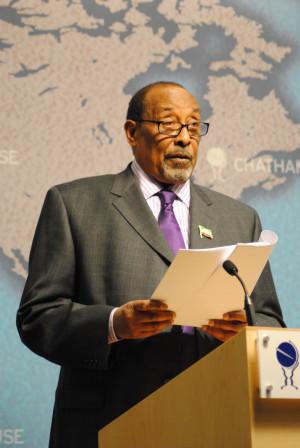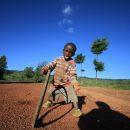Of Titans and Trolls in South Africa and Somaliland – By Ahmed M.I. Egal

During the last two weeks we have lost two titans of African politics: the first, and somewhat lesser giant, was Ambassador Axmed Maxamed Adan (Qaybe) of Somaliland, and the second, was the inestimable Nelson Mandela. Mandela was a figure of global renown, loved the world over as an icon of the struggle for the liberation of South Africa from the tyranny apartheid, while Qaybe is known, but loved no less, by the Somali-speaking people of the Horn of Africa.
I have chosen to join these men in tribute because they were both stalwarts and leaders of their respective countries’ struggle for independence and self-government, as well as exemplary public servants who chose the path of principle and integrity over expedience and personal aggrandisement. Each of these men, in their own ways and in the context of their respective countries and struggles, presents an example of the highest standards of political integrity and public service to which one may aspire, and this places them in glaring contrast to the charlatans, arrivistes, tribal plutocrats and money-grubbing kleptocrats that masquerade as African political leaders, i.e. the trolls of the continent’s politics.
For non-Somali readers, it might be helpful to provide some information on Ambassador Qaybe and his role in Somaliland politics. Qaybe was born in 1930 in the Royal Naval Station in Aden where his father worked for the Royal Navy. Qaybe served in various administrative positions within the colonial administration of Somaliland until 1959 when he was appointed as Executive Secretary of the Advisory Legislative Council established to represent Somaliland public opinion to the colonial administration. After independence in June 1960, Qaybe was appointed as Cabinet Secretary in the first independent Government of Somaliland, and after union with the ex-UN Trust Territory of Somalia to the south, Qaybe served as Ambassador in many important posts including Ethiopia, USSR, UN and WashingtonDC.
During his long career in public service, which culminated when the Siyad Barre regime collapsed in 1991 when he was Foreign Minister, Qaybe was known not only for his professionalism and skill as a diplomat, but equally for his scrupulous honesty and personal integrity. He returned to Somaliland in 1997 and threw himself wholeheartedly into the reconciliation and nation-building project that was underway in the country. He was elected by the Parliament of Somaliland as its President and worked diligently to expand its capabilities and capacities.
At this time, there was a concerted campaign, by internal and external forces, to derail Somaliland’s effort to establish a representative, national government through reconciliation and peace-building. A central plank of this campaign was to foment conflict and dissent among the Harti community in the east of Somaliland (from which Qaybe hails) by their kinsmen across the border in Puntland/Somalia. The fact that this sustained appeal to ethnicity failed is due, in large part, to the principled stand of Harti leaders like Qaybe which flatly rejected the politics of ethnicity and upheld the values of fraternity, peace among neighbours and collective progress. When the time came, Qaybe evolved from skilled diplomat to political leader without breaking his stride, at great personal cost. Qaybe continued to live in Hargeisa as an ordinary citizen and a greatly esteemed elder statesman and Presidential Advisor until his recent death.
If Qaybe and Mandela represent the titans of African politics, then it is a sad fact that their opposites – the crooks, kleptocrats and charlatans – are represented among African leaders in far greater number. Unfortunately, in this category of autocratic charlatans we must include the current President of Somaliland – Ahmed Mohamoud (Silanyo). In fairness, we can only consider Silanyo an autocrat-aspirant since the firmness of his grip on absolute power in Somaliland is not yet proven, and he has yet to demonstrate the political acumen to ensure the perpetuation of his rule either in person, dynastically or through proxy. Developments over the coming year and a half leading to the next Presidential elections will determine whether Silanyo graduates as a bona fide civilian dictator or whether the people of Somaliland will subvert his mission and ensure the survival of their successful experiment in representative government and political freedom.
The Silanyo government’s bent towards autocratic rule unfettered by constitutional safeguards and the rule of law was first evidenced almost immediately after coming to power in 2010, by its repression of press freedoms and the expression of dissent from any quarter. This clear policy of repression of political dissent, imprisonment of journalists that do not tow the government line and heavy handed treatment of civil society activists, has been augmented in recent months by a shadowy campaign of assassination attempts and targeted violence against prominent political opponents and critical journalists in which elements of the security services seem implicated.
This campaign, and the seeming impotence of the security services to apprehend and prosecute the perpetrators, has generated an inevitable backlash with a senior ruling party official targeted in a tit-for-tat assassination attempt, which mercifully failed. This is not to say that the government is behind this campaign of targeted violence against its political opponents, but it is certainly true that the cavalier attitude of the security services to the apprehension and prosecution of the perpetrators has engendered a climate of impunity which has contributed to its growth.
This wave of targeted assassinations is totally new to Somaliland political and social life and is very worrying. Even more ominous is the attitude of the security services, in particular the Minister of Interior. It is absolutely incredible, not to mention criminal, that he would personally release the perpetrator of an assassination attempt upon an opposition MP (before he was brought before a court) on the basis, that “˜this matter is best resolved through traditional channels between the clans of the victim and the perpetrator’. Other perpetrators of targeted violence against journalists and civil society activists have been reported as wearing the uniforms of security service personnel and none of them have been apprehended, despite a wealth of witness and victim evidence.
This culture of lawlessness and executive autocracy has generated opposition from civil society as well as the opposition parties. In particular, a group of senior politicians, including many who were either allies of Silanyo during his years as an opposition party leader and others who were senior ministers in his first government in 2010, got together to form the grandiosely named Committee for National Consultations & Guidance (CNCG) in July 2013. Rather than ameliorate the government’s increasing autocracy and crackdown on all forms of what it perceived as dissent, including quite benign criticism in the press and from civil society activists, the establishment of the CNCG created panic within the government and various ministers took it upon themselves to declare the organisation illegal and even treasonous. The national conference planned by the CNCG to discuss government policies and its perceived failures and mistakes was declared by senior ministers as also illegal and treasonous and they swore to prevent it being held at all.
These statements are in direct contravention of Article 22.1 of the Somaliland Constitution which enshrines the right of citizens to participate in political, economic, social and cultural affairs in accordance with the law. The only constraint on this freedom of participation imposed by the law is with respect to political parties which are limited to the three national parties which emerged from the local and regional elections. However, the CNCG is not a political party, nor does it seek to be. Rather it is a non-partisan, political organisation established to initiate and conduct a national dialogue on policy and the direction the country is taking. As such, it is neither illegal nor treasonous, despite the panicked and intemperate bluster and threats of the government and its spokespeople.
The government’s strong-arm tactics reached the peak of illegality and autocratic over-reach recently when two leaders of the opposition parties (UCID and WADDANI) were prevented from visiting the town of Gabiley which is about 90km from Hargeisa. The purported reason for this incomprehensible restriction of these citizens’ right to free movement (enshrined in Article 23 of the Constitution) was that they had not advised the local authorities of their trip in advance. This is the most amazing example of official claptrap since it is not incumbent upon citizens, whether they are leaders of political parties, vegetable sellers or ordinary people proceeding about their business, to advise local authorities of their movements.
It is incumbent upon the people of Somaliland to defend the freedoms and rights that were won after a long decade of war that devastated the country, decimated the people and forced hundreds of thousands into exile. It is inconceivable that the brave people of this unique little country that defeated one of the largest armies in black Africa, and fashioned itself into a beacon of hope, representative governance and gritty self-reliance in the Horn of Africa will yield to the autocracy, arrogance and denial of rights that the Silanyo government seeks to impose.
The fatal shortcoming of all trolls, and political trolls are no exception, is that they cannot see beyond their stunted vision of aggrandisement and self-interest, just as the true greatness of giants is their ability to see and articulate a grand vision of justice and collective progress. Mr. Silanyo and his acolytes would do well to study the history and character of their people before their mendacity, subterfuge and misgovernment place them on the wrong side of history and condemn them to the dustbin.
Ahmed Egal was educated in the UK and holds a BA in Economics & Politics from Warwick University and an MA in Area Studies from the University of London. He has worked as an international banker in London and the Gulf Region for over twenty years, and is presently engaged as an independent financial and business development consultant.






